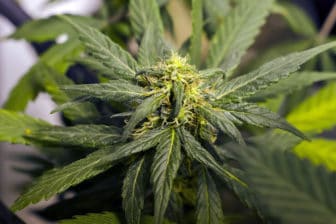The Mexican Supreme Court’s recent decision declaring prohibition against the personal possession of marijuana as unconstitutional put the issue of legalizing the intoxicating substance back on the public policy agenda.

Brett Levin / Creative Commons
The Mexican Supreme Court recently put debate about legalizing marijuana back on the agenda in that country. (photo cc info)
Although Mexican President Enrique Peña Nieto endorses a debate on regulating marijuana, he reiterated his opposition last week to the recreational consumption and legalization of the drug.
In remarks made officiating the new National System for the Integral Protection of Children and Adolescents, Peña Nieto said he is concerned how marijuana legalization would impact youth.
Still, the Mexican leader held out the possibility of legal cannabis for medicinal purposes.
“The state has to do its part to combat crime but without risking children and youth,” Peña Nieto insisted.
Opponents of legalization like Peña Nieto and the federal government’s Juvenile Integration Centers, a national network of drug treatment and substance abuse prevention centers, warn that legalization would increase addictions not only to marijuana but other substances for which pot allegedly serves as the proverbial gateway drug. More addictions will foment more crime — so goes the argument of legalization opponents.
Backers of legalization, on the other hand, point to the health, social and economic costs of two legal and widely consummed drugs — tobacco and alcohol. According to Mexican columnist Jose Gil Olmos, Mexico’s official National Institute of Statistics, Geography and Informatics (INEGI) has pinned 247,000 deaths on tobacco usage from 2003 to 2012.
Widely consumed in Mexico, beer and other alcoholic beverages are even sometimes easier to obtain than safe drinking water. The names of beer, tequila and other alcoholic beverage companies adorn public buildings, emblazon the jerseys of soccer players and cover public space in both rural and urban areas.
In short, alcohol brands and their consumption are etched into the conciousness of Mexicans at a very young age.
Alcohol producers can even get red carpet treatment in the Mexican political economy. For instance, President Peña Nieto and Chihuahua Gov. César Duarte lauded the Dutch transnational Heinken’s decision earlier this year to invest approximately $465 million in the construction of a new brewery set for the town of Meoqui, Chihuahua, located south of the state capital.
Expected to create 500 permament jobs and send upwards of 100 suds-laden trucks onto the country’s highways daily, the brewery is slated to begin production in early 2017.
In a column last week, Olmos wrote that the World Health Organization attributes 24,000 traffic deaths in Mexico every year to alcohol-related accidents. Again citing INEGI, Olmos wrote that traffic accidents and alcohol-related disease are rated as two of the top four causes of mortality for Mexicans aged 35 to 44, with alcohol-influenced liver disease accounting for 12,540 deaths in the country annually.
No comparable statistics are linked to marijuana usage.
“(Tobacco and alcohol), which are permitted or legalized since decades ago, might be more dangerous than the use of marijuana, but the fear that (marijuana) generates more death and violence continues being the principal argument that the government and the most conservative sectors of Mexican society will toss out,” Olmos contended.
“In the face of inevitable legalization, the education of children and young people, attention to (pot) smokers and the tax regulation of this drug will have to be discussed as part of the gradual forms of this opening,” he wrote.